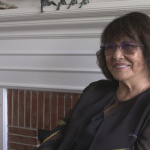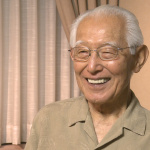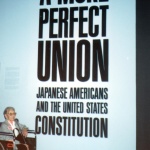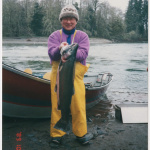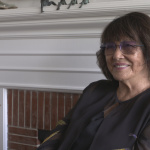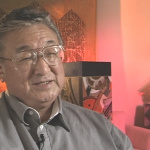Manzanar Committee
The Manzanar Committee, an all-volunteer nonprofit organization, formed to educate the general public about the World War II imprisonment of Japanese Americans in United States concentration camps. [1]
Origins
The Manzanar Committee was established in January 1970 with Nisei and former Manzanar inmate Sue Kunitomi Embrey and Yonsei Warren Furutani as co-chairs. The Manzanar Committee evolved from the Manzanar Project Committee of the Organization of Southland Asian American Organizations, which coordinated the first organized pilgrimage to Manzanar in December 1969. The initial purpose of the Manzanar Committee was to disseminate information and to make presentations about the history of the Japanese in America and the community's experiences during World War II. Additionally, the committee set out to obtain California State Historic Landmark status for the site, which it successfully accomplished in January 1972.
As Furutani became busy with other political activities, Embrey became the driving force behind the committee and would go on to serve as the committee chair for the next 36 years until her death in 2006. Since Embrey worked as a school teacher with the Los Angeles Unified School District (LAUSD), she was well aware of the lack of information on the World War II camp experiences of Japanese Americans in the American history books. She contacted the LAUSD Asian Pacific American Educators Association and worked jointly with them to conduct teacher training workshops, develop curriculum material and to sponsor teacher participation in an annual pilgrimage to Manzanar.
Embrey also approached Rose Ochi , an attorney and former Rohwer inmate, about having the committee incorporated as a nonprofit organization with the State of California. Ochi filed incorporation papers on December 22, 1975, and the state officially endorsed the filing on January 6, 1976. Inaugural board members included Embrey as chair; Don Rundstrom as secretary; and board members Susan Rundstrom, Ken Honji, Pat Rosa and Ron Rundstrom. The Rundstroms continue to be longtime volunteers of the committee. At the request of Embrey, Ochi also agreed to act as the committee's pro bono legal counsel and headed a legislative strategy to preserve Manzanar for historical and educational purposes.
Preserving the Manzanar Site
Embrey and Ochi forged a tight partnership, and the two spearheaded an effort to get the former Manzanar site preserved as a National Park Service (NPS) unit. At that time, the former camp site, which lay in Inyo County, was under the jurisdiction of the Los Angeles Department of Water and Power (DWP). The DWP opposed any land swap with the federal government to establish an NPS unit and played on the fear that water rights to the City of Los Angeles would be obstructed if a land exchange went through.
Ochi, who was then working as an executive in the Los Angeles mayor's office, was aware that much of DWP's fear mongering was political posturing. Since both Ochi and the DWP worked for the City of Los Angeles, she could not publicly lobby on behalf of the Manzanar Committee so she passed over to Embrey the names and addresses of various elected and appointed officials and media people that should be contacted by the Manzanar Committee. Additionally, Ochi embarked on a public relations campaign with the Inyo County elected officials and residents, who initially opposed what they misconstrued as a World War II Japanese prisoner of war camp.
Embrey and Ochi also testified before the U.S. Congress on behalf of the Manzanar Committee and successfully got the campsite established as a National Historic Landmark in 1985 and as a National Historic Site on March 3, 1992. Congress also established the Manzanar Advisory Commission in March 1992 to advise the Secretary of the Interior on the development, management and interpretation of the newly created unit of the National Park Service. The inaugural Commission included 11 members, selected from over 40 nominees and represented a diverse group of people from Inyo County residents, the general public, Native Americans and Japanese Americans. The commissioners included Keith Bright, Bill Michael (vice chair), Vernon Miller, Richard Stewart, Martha Davis, Glenn Singley, Rose Ochi, Ron Izumita, Sue Embrey (chair), Gann Matsuda and Mas Okui.
Although Manzanar was established as a National Historic Site in 1992, appropriations were not part of the bill, so a superintendent's position was not created until 1994, using funds from the Death Valley National Monument. The Manzanar Advisory Commission helped to hire Manzanar's first superintendent, Ross Hopkins. As the Manzanar National Historic Site continues to develop, the Manzanar Committee remains committed to its original educational purpose and helps the NPS staff put on the annual pilgrimage and oversees the pilgrimage's Manzanar After Dusk program for students.
For More Information
Manzanar Committee. http://www.manzanarcommittee.org/The_Manzanar_Committee/Home.html .
Murray, Alice Yang. Historical Memories of the Japanese American Internment and the Struggle for Redress . Stanford: Stanford University Press, 2008.
Footnotes
- ↑ Sources for this article include interviews with Rose Ochi (2010) and Takenori Yamamoto (2011), Manzanar Committee papers of incorporation, and various press releases from the U.S. Department of the Interior, all in possession of the author.
Last updated July 31, 2015, 2:49 a.m..

